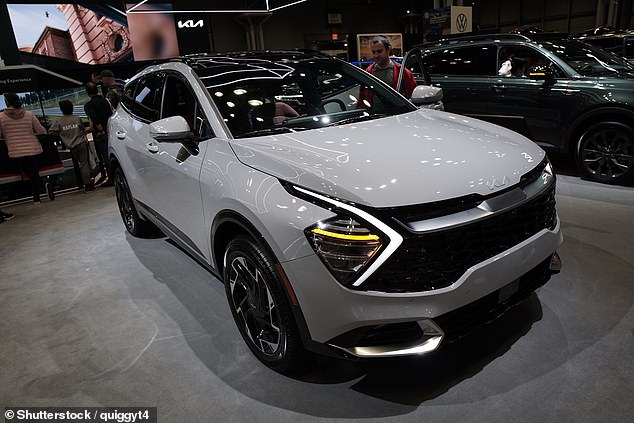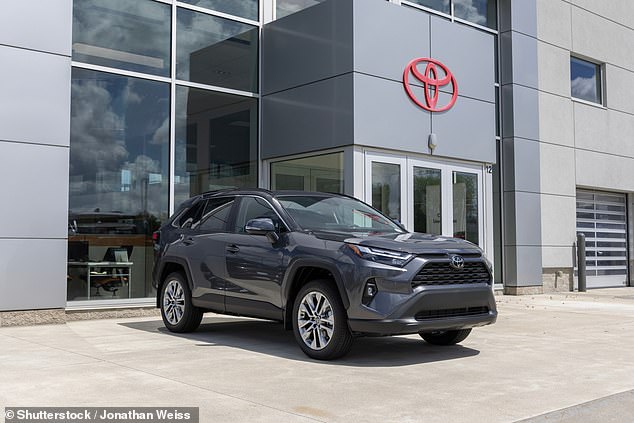Electric cars are far less reliable than traditional petrol vehicles, bombshell study finds
Electric vehicles are, on average, much less reliable than gasoline cars, trucks and SUVs, according to a new survey of 330,000 car owners.
US publication Consumer Reports surveyed owners of cars built between 2021 and 2023, along with a small number of 2024 models, and found that electric cars had 80 percent more problems than cars with internal combustion engines (ICE).
Among the most commonly reported problems were problems with the battery and charging system, as well as defects in the way the vehicles' body panels and interior parts fit together.
Over the three model years, electric cars had 79 percent more problems than ICE cars, while plug-in hybrids had 146 percent more problems.
Consumer reports found that EV vehicles had twelve potential problem areas, while hybrids had nineteen, plug-in hybrids twenty and ICE vehicles seventeen.
But the study also found that even though new EV cars had a simpler powertrain, gasoline vehicles had been fine-tuned over the years to be highly reliable.
A new study has found that electric cars are less reliable than petrol cars, which the authors say is due to the fact that they have not yet solved the problems in new systems (in the photo a Tesla Model 3).
The magazine and website noted that EV manufacturers are still learning to build systems from scratch, and suggested that doing so should improve the overall reliability of electric vehicles.
“This story is truly one of growing pains,” said Jake Fisher, senior director at Consumer Reports.
“It's a story about working out the bugs and kinks of new technology.”
Still, the company noted that ongoing reliability concerns will likely contribute to the issues that are causing many buyers to hesitate when considering a switch to the new technology, such as higher costs, long charging times and access to charging stations.
The study found that the only electric vehicle type that surpasses ICE vehicles in terms of reliability with 26 percent fewer problems is the conventional hybrid, which uses both electric and gasoline systems, as opposed to the plug-in hybrid that uses only the gasoline engine as a backup up used.
Among hybrid vehicles, Toyota performed well with its Camry, Highlander and RAV4 models, along with the UX and NX hybrids from its luxury Lexus arm.
Among plug-in hybrids, the Kia Sportage was the star.

The Kia Sportage (pictured) was one of the better performing plug-in hybrids, which use a petrol engine as a backup when the electric motor runs out of power
According to Consumer Reports, owners of electric vehicles including the Ford F-150 Lightning, Mustang Mach-E, Genesis GV60, Hyundai Ioniq 5, Kia Niro EV, Volkswagon ID.4, Suburu Solterra and Toyota bZ4X have reported problems.
The most reliable automakers identified in the report included Lexus in first place, Toyota in second place and Mini in third place.
Tesla was mid-pack, but Mr Fisher said it was in the sweet spot of the EV market.
The best-selling EV in Australia is the Tesla Model 3, which was also the second best-selling passenger sedan on the market regardless of fuel type.
Sales of electric vehicles in the country more than tripled in the first nine months of 2023 compared to the same period in 2022.
Between January 1 and September 30, there were 65,743 electric cars registered on Australian roads.
Among the EV owners who explained problems with their vehicles to Consumer Reports was Michael Coram of Lockport, New York, in the US.
Aiming to reduce his commuting costs, Coram purchased a 2023 Chevrolet Bolt electric SUV in July, attracted by its sporty driving. Coram, 44, a heating and air conditioning technician, said he encountered one annoying problem: On a cold day in mid-November, his Bolt wouldn't shift into drive mode.
Finally, after Coram turned the car on and off ten to twelve times, the problem resolved itself, and he hasn't had it since.
Other owners on a Bolt social media forum told Coram he may have switched to driving before the SUV's computer finished booting up.
Additionally, owners of Hyundai's Ioniq 5 EV reported battery and charging issues related to a charging control computer, which in some cases brought the vehicles to a standstill.
Rivian, a startup maker of electric pickups and SUVs, had problems properly aligning body panels and broken interior parts, Fisher said.
Tesla, the EV sales leader, which now has years of experience building vehicles, showed an improvement in reliability, Fisher said.
This was largely because a large portion of Tesla's sales were of the relatively small and cheaper Model Y SUV and Model 3 cars.
These are easier to build and lack the new technology that Telsa offers in its more expensive vehicles, the Models S and X.

Toyota, which has invested heavily in conventional hybrid technology, was the best-performing brand along with its luxury arm Lexus
Tesla ranked 14th out of 30 car brands in the 2023 survey, up from 19th in 2022.
Lexus, Toyota's luxury brand, was the most reliable in the survey, followed by Toyota, Mini, Acura and Honda.
The five lowest brands were Jeep, Volkswagen, Rivian, Mercedes-Benz and Chrysler.
The most reliable segment of the market was compact cars, followed by sports cars, small pickups, medium and large cars, luxury medium and large cars. Electric cars, electric SUVs, full-size pickups, midsize pickups and electric pickups had the worst reliability.
Consumer Reports says its survey of subscribers, which represents 330,000 vehicles.
Owners of vehicles from model years 2000 through 2023, with some 2024 models, were asked about the problems they had experienced over the past 12 months.
